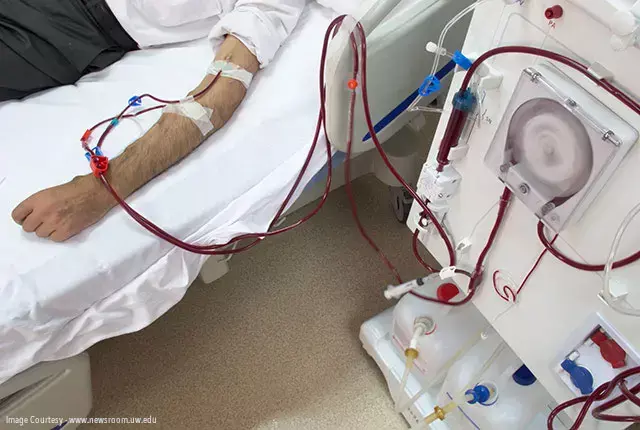- Home
- Medical news & Guidelines
- Anesthesiology
- Cardiology and CTVS
- Critical Care
- Dentistry
- Dermatology
- Diabetes and Endocrinology
- ENT
- Gastroenterology
- Medicine
- Nephrology
- Neurology
- Obstretics-Gynaecology
- Oncology
- Ophthalmology
- Orthopaedics
- Pediatrics-Neonatology
- Psychiatry
- Pulmonology
- Radiology
- Surgery
- Urology
- Laboratory Medicine
- Diet
- Nursing
- Paramedical
- Physiotherapy
- Health news
- Fact Check
- Bone Health Fact Check
- Brain Health Fact Check
- Cancer Related Fact Check
- Child Care Fact Check
- Dental and oral health fact check
- Diabetes and metabolic health fact check
- Diet and Nutrition Fact Check
- Eye and ENT Care Fact Check
- Fitness fact check
- Gut health fact check
- Heart health fact check
- Kidney health fact check
- Medical education fact check
- Men's health fact check
- Respiratory fact check
- Skin and hair care fact check
- Vaccine and Immunization fact check
- Women's health fact check
- AYUSH
- State News
- Andaman and Nicobar Islands
- Andhra Pradesh
- Arunachal Pradesh
- Assam
- Bihar
- Chandigarh
- Chattisgarh
- Dadra and Nagar Haveli
- Daman and Diu
- Delhi
- Goa
- Gujarat
- Haryana
- Himachal Pradesh
- Jammu & Kashmir
- Jharkhand
- Karnataka
- Kerala
- Ladakh
- Lakshadweep
- Madhya Pradesh
- Maharashtra
- Manipur
- Meghalaya
- Mizoram
- Nagaland
- Odisha
- Puducherry
- Punjab
- Rajasthan
- Sikkim
- Tamil Nadu
- Telangana
- Tripura
- Uttar Pradesh
- Uttrakhand
- West Bengal
- Medical Education
- Industry
Inadequate zinc intake in hemodialysis patients tied to higher mortality risk: Study

Lisboa, Portugal: A recent study in the Journal of Renal Nutrition showed a high prevalence of hemodialysis (HD) patients having inadequate zinc intake. This is related to higher mortality risk and worse nutritional and body composition parameters.
Zinc, a trace element, is essential for human nutrition and plays an important part in hemodialysis patients. Considering the key importance of an adequate zinc intake, and the lack of studies evaluating the relationship between its consumption and survival in HD patients, Cristina Garagarza, Nutrition Department, Nephrocare, Lisboa, Portugal, and colleagues aimed to analyze the relationship between zinc intake and mortality in HD patients.
For this purpose, the researchers conducted a longitudinal, prospective, multicenter study consisting of 582 HD patients from 37 dialysis centers. They recorded clinical and body composition parameters. Using the Food Frequency Questionnaire and International Physical Activity Questionnaire, dietary intake and physical activity data were obtained.
The mean age of the patients was 67.8 ± 17.7 years and median HD vintage was 65 months.
Following were the study's salient findings:
- About 53.6% of the patients presented a deficient daily intake of zinc.
- Patients with the highest zinc intake were those who had a higher lean tissue index, energy, and protein intakes.
- Zinc intake was positively correlated with energy and protein intake and negatively correlated with the malnutrition screening tool score.
- Higher energy, protein, and lower carbohydrates intake, as well as lower HD vintage and higher lean tissue index, were predictors of zinc intake.
- Higher mortality risk was observed in patients with zinc intake below the recommended values, even after the adjustment for age, presence of diabetes, gender, dialysis vintage, albumin, lean tissue index, energy intake/kilogram, and level of physical activity.
"Our results showed a high prevalence of HD patients with an inadequate zinc intake, which is associated with worst nutritional and body composition parameters and with a higher mortality risk," wrote the authors. "Food sources that most contribute to increase zinc consumption are also rich in protein, that also an extremely important nutrient for these patients."
Reference:
The study titled, "Zinc Deficient Intake in Hemodialysis Patients: A Path to a High Mortality Risk," was published in the Journal of Renal Nutrition.
Dr Kamal Kant Kohli-MBBS, DTCD- a chest specialist with more than 30 years of practice and a flair for writing clinical articles, Dr Kamal Kant Kohli joined Medical Dialogues as a Chief Editor of Medical News. Besides writing articles, as an editor, he proofreads and verifies all the medical content published on Medical Dialogues including those coming from journals, studies,medical conferences,guidelines etc. Email: drkohli@medicaldialogues.in. Contact no. 011-43720751


